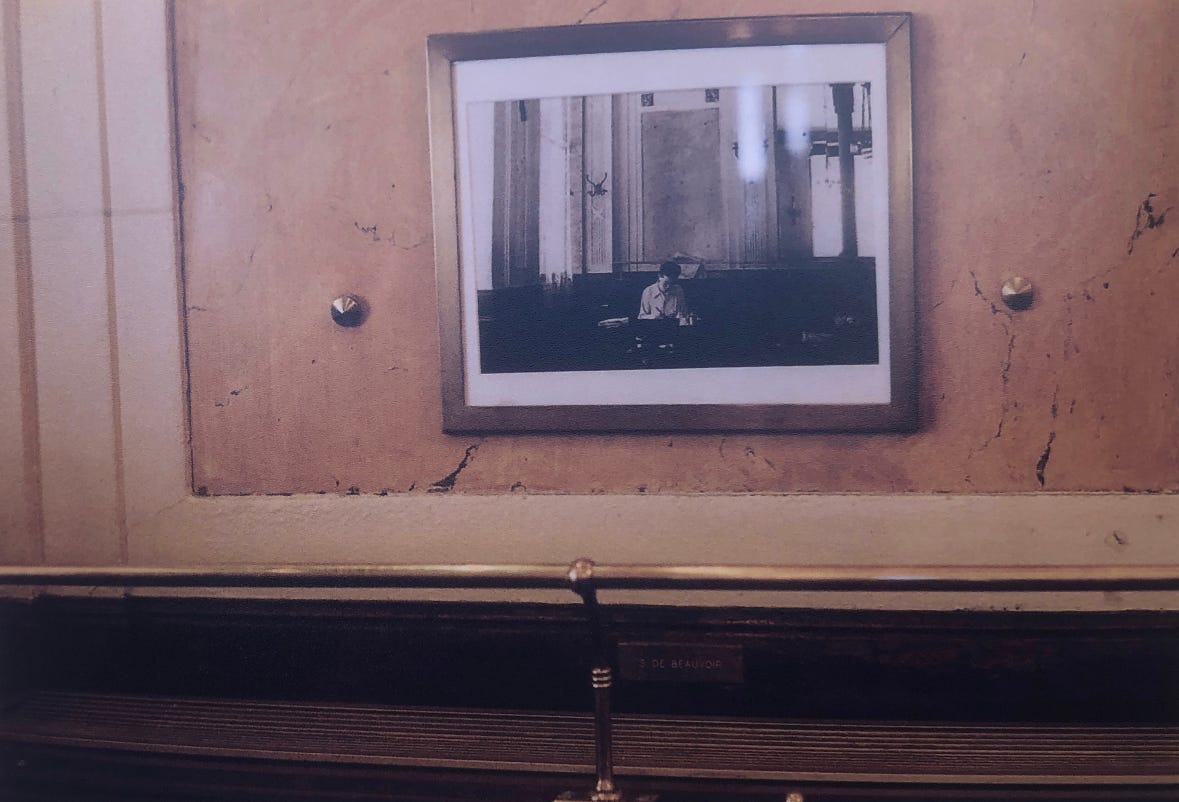i am walking a lot. i am walking and i am also reading a lot. both actions very fast and all overlapping.
i am reading three books, all the while i am trying to retrace the steps of the authors: deborah levy and simone de beauvoir. they are also walking a lot. with bold, resolute strides.
sometimes i feel like i have to run to keep up with them.
in real estate, deborah levy is walking all over montmartre. and in swallowing geography, an early semi-biographical novel (arent all novels, by the way, inherently biographical?), her character jk is walking all around the european continent with her typewriter in a pillowcase. in my third read, de beauvoir is also walking. she’s walking out of a suffocating paris and into the future as a woman with intellectual power. while her best friend, zaza, is walking nowhere.
this is because zaza’s family won’t let her leave the house. because in this part of paris, a woman can’t walk where she pleases without making sure to please the world first.
it is the 14th of july. bastille day.
i am sitting at de beauvoirs very own existentialist café with a café crème, away from all the people, because i am honoring who i am. my friend, the little patriot, is honoring who she is by going out and seeing the parade.
[we must all find different ways to honour our own particularities]
im reading the inseparables and i like how simone was a little patriot herself as a young girl. though the patriotic particularities she honored weren’t her own; as the child of a right-leaning father, a devout placating mother, her vast intellectual mind felt lonely and unstimulated in the ways that weren’t her own. it was only when she met her best friend, zaza, that she began to find her own particularities in which to honour.
in the foreword of the novel, levy writes that the girls meet and have long conversations with each other, and don’t stop for twelve years. lauren elkin (translator) writes that she had to find a way to make the dialogue readable – so much of it was just direct speech (she said, she said, she said).
levy: the talking cure between andrèe [zaza] and sylvie [simone] is nothing less than a revolution at a time when girls and women were encouraged to keep their thoughts to themselves.
what this tells us it that for these two young women, talking was a way in which to illuminate their own hidden particularities.
now i have to illuminate mine.
my patriot friend and i have taken to reading aloud to each other. today, over an omelette and a monsieur croque, she read from de beavuoirs the woman destroyed. the narrator – a woman grappling with her husbands infidelity – (again, the questions of biographicality), is sitting at a café of her own, and she’s describing another young parisienne as neither a student nor a prostitute – as if a woman sitting alone could only be one of two alternatives.
in turn, i read aloud from levys real estate. in which levy writes of female characters missing their own desires. women devoid of their own subjectivity, stolen of their own vivid life.
as im reading this to my patriot friend, i can think of no better description for zaza. as a young woman, bound to the service of her family, she is forced to put her own subjectivity on hold for the needs of her family. her mothers grip get so tight on zaza that eventually she suffocates: her lover is taken away, her contact with sylvie is restricted – even her own free time is taken and replaced with menial tasks set before her by her mother.
this new way of life is constructed like a wall around her, leaving no space left for the subjective.
levy said that if she had to describe the novel in a word, it is disobedience. and i could think of no better alternative titel. it is about the disobedience of the pressures and expectations society puts on women, and what happens if one ignores the call of that disobedience. sylvie [simone] answers the call. she escapes, with the ticket a university degree in philosophy offers her, grasping it so hard her knuckles go white. zaza isn’t so lucky. she dies in a hospital bed, from the exhaustion of being a placating daughter, from the suffocation of trying to fit into the constricting mold of a good girl – call it what you will.
i think simone wrote this story for nothing else except to illuminate what happens when society forces women to snuff out their own subjectivity. without the power of particulars, and the time in which to figure out ones particulars, a woman is left devoid. destroyed from the abscence of her own missing desires.
which leads us to the grave.
at the père lachaise cemetery, a headstone is covered in red lipstick kisses. it is the headstone of sartre and simone. many people come to pay their tributes, leaving smudges and old metro tickets in their wake.
i stand and witness two very different old french women leave theirs.
one touches the name of simone de beauvoir, closes her eyes, and says: une moment de salute.
which needs no translation.
then another women comes.
she stands before the graves, casts a demanding eye over the red smudges and littered tickets, and explodes:
c’est incroyable!
which also needs no translation.
as i stand there im wondering about these tickets. there had to be hundreds – wedged in place by little pebbles to keep the wind from carrying them away. why had people left them?
later, googled offered me three possible solutions:
1. they were a reference to metro riots where sartre and de beauvoir had been involved.
2. a cause of simple mass effect. (seeing all those old ticket-stubs, i too wanted to rummage around my bag for one, as to not feel left out).
3. as an allusion to a quote from ones of sartres essays about life being like a passenger on a train without a ticket (here i turned to google again, but i could find no source for this quote).
i was left satisfied with none of these answers. they were all too vague, too arbitrary. perhaps they made sense together. a choose-your-own alternative.
like the two different french women. you could close your eyes, say a prayer, or express your incroyable feelings at the state of the world.
on the way home, my patriot friend and i stop for pizza. fresh out of the napolitaine oven comes two truffle and ham pizzas. the best we’ve tasted by far. as we devoured them, hot and delicious, we talked about all of this that had been on my mind.
id rather be an interesting person than a good girl, i said.
my patriot friend understood.
she told me that so many young women fall into the trap of trying to be good girls that they end up placing too much value on meeting the expectations of others.
which includes constantly trying to improve ones looks, she added.
i do not want to wake up an old woman and find, that the only worth ive placed on myself – my looks – have abandoned me.
i want to cultivate my mind instead, she said. i want to spend that energy on trying to be a warm, knowledge-seeking individual instead.
i thought of zaza, who died under the suffocating pressure of society wanting her to be a good little girl.
then i remember the words of de beauvoir:
be loved, be admired, be necessary; be somebody
somebody who honours her own subjectivity by being disobedient.
we payed our tab, walked home through montmartre. below sacre-cour the sunset was painting the pale walls of pigalle pink in the powdery light. i thought of levy’s 21st century paris, and of simones older one.
in both versions, two women walked alone, their head held high. a disobedient little raise of the chin to the society that demands the suppression of their own desires.
holding tight to my own subjectivity, i walk home in the fading pink sunset.
chin also a little disobediently raised.
to women walking their own paths literary and otherwise.
see you soon with nora ephrons feelings about her neck and other things.
hope your august is treating you well.
love,
e.










you are simply the greatest
i love this so much you have no idea